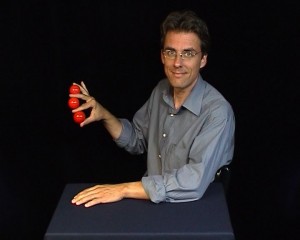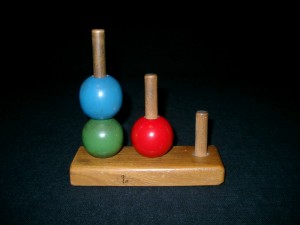Insight problem solving
The phenomenon of insight remains one of the great mysteries of cognition. Sometimes, the solution to a difficult problem pops into mind seemingly out of the blue, often when we are not even consciously thinking about the problem. Insights are crucial for problem solving, creativity and innovation. I am interested in the underlying restructuring processes that enable sudden insights. Another focus of my work is on the phenomenology of insight: The delightful feeling of „Aha!“ which everyone craves. Aha! experiences are not only immensely pleasurable, but also provide memory benefits.
Learning from insight
I am trying to clarify the mechanism behind the insight memory advantage. Why are insightful solutions remembered better than solutions for which problem solvers do not report insight? What is the unique contribution of cognitive and affective components, respectively?
Read a paper on the insight memory advantage
Magic trick paradigm
In my research, I use magic tricks as a tool to investigate insight. Problem solvers are presented with video clips of magic tricks and try to discover the magician’s secret method. This is quite a challenging task – but it triggers strong Aha! experiences.
Complex problem solving
A high degree of systems thinking is required to deal with the challenges of an increasingly complex and interconnected world. In contrast to static problems, complex problems are characterized by inherent dynamics, lack of transparency and a polytelic goal structure. How do people approach such complex problems? Which factors influence their performance? What are the limitations? The theory of complex problem solving provides a helpful framework to model the underlying cognitive processes. The ultimate goal of this research is to make us all better problem solvers.
Expectation violations
Over time, people form an implicit belief system about what is possible in the world around us. They expect certain outcomes from their actions (e.g. if I smash an egg to the ground, it will break). Magic tricks violate these expected causal relationships. We try to identify brain regions that are crucial for expectation violations by combining behavioural and neuroimaging experiments. Read a related paper here
Analytical problem solving with Tower of London / Tower of Hanoi
These classical puzzles are widely used to assess planning and problem solving abilities. In studies involving patients with chronic brain lesions, their problem solving behaviour is compared to that of healthy controls. Differences can be found with regard to general performance, but also in the use of problem solving strategies.
Action understanding
For humans as social beings, it is crucial to understand the actions of others. I have developed a new, non-verbal test to assess this ability: The Tomato & Tuna Test. We could show that this test reveals subtle deficits in brain-damaged patients. The test is easy to administer and all stimuli are freely provided here.

